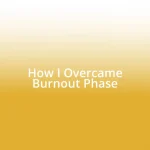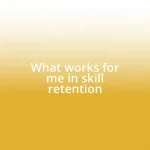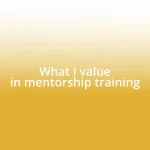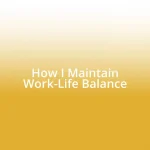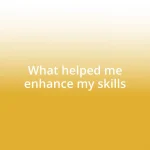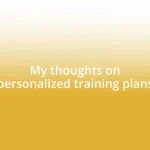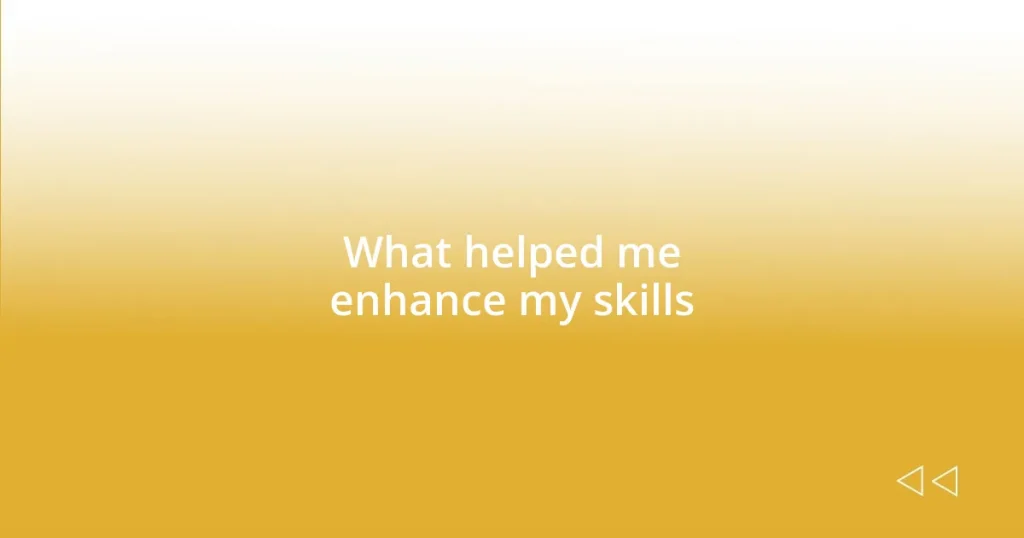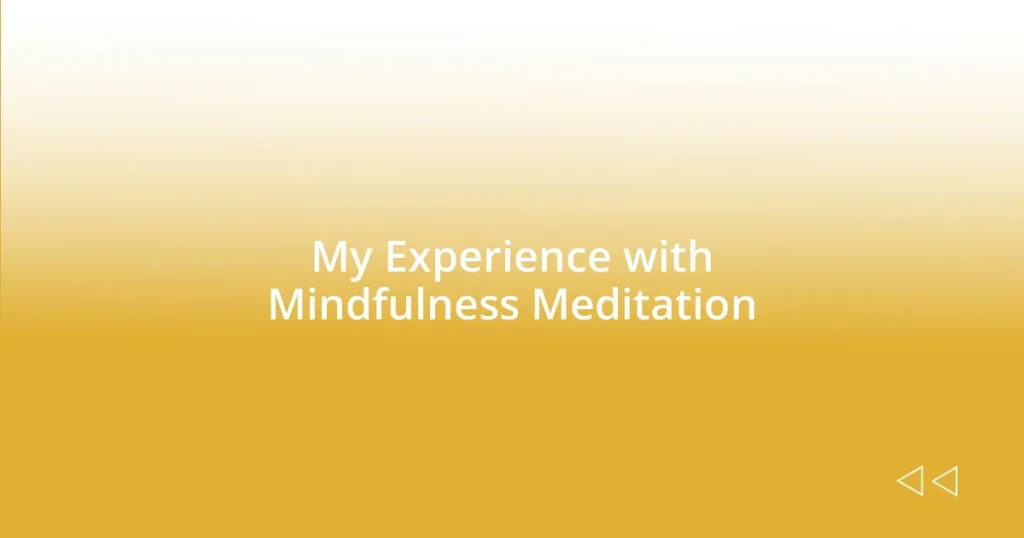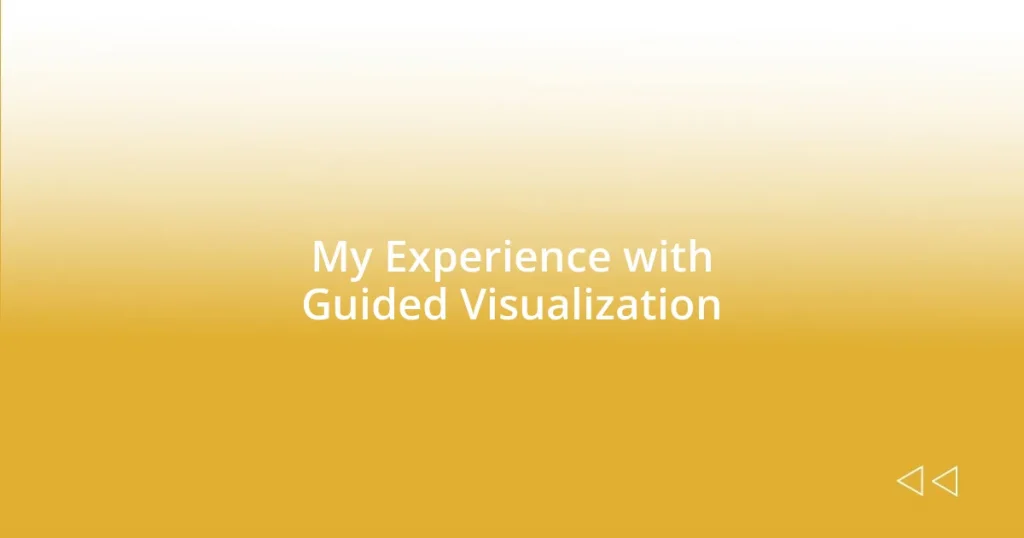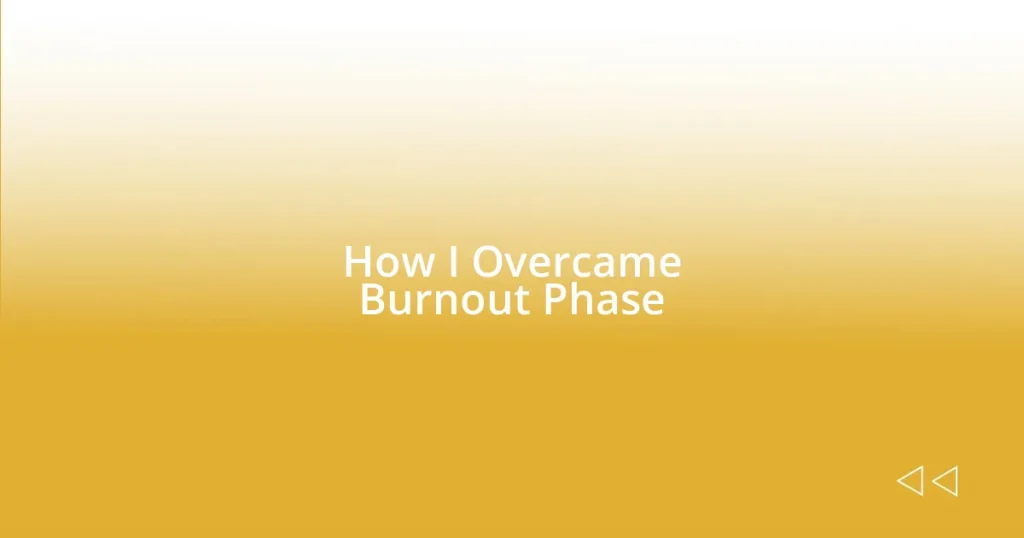Key takeaways:
- Mentorship significantly boosts skills and confidence by providing guidance and relatable experiences.
- Setting clear and specific goals aligns efforts with passions, making skill development more focused and meaningful.
- Engaging in practical exercises enhances learning through hands-on experiences, immediate feedback, and community interaction.
- Reflecting on personal progress reveals growth and motivates continuous improvement, emphasizing the value of learning from mistakes.
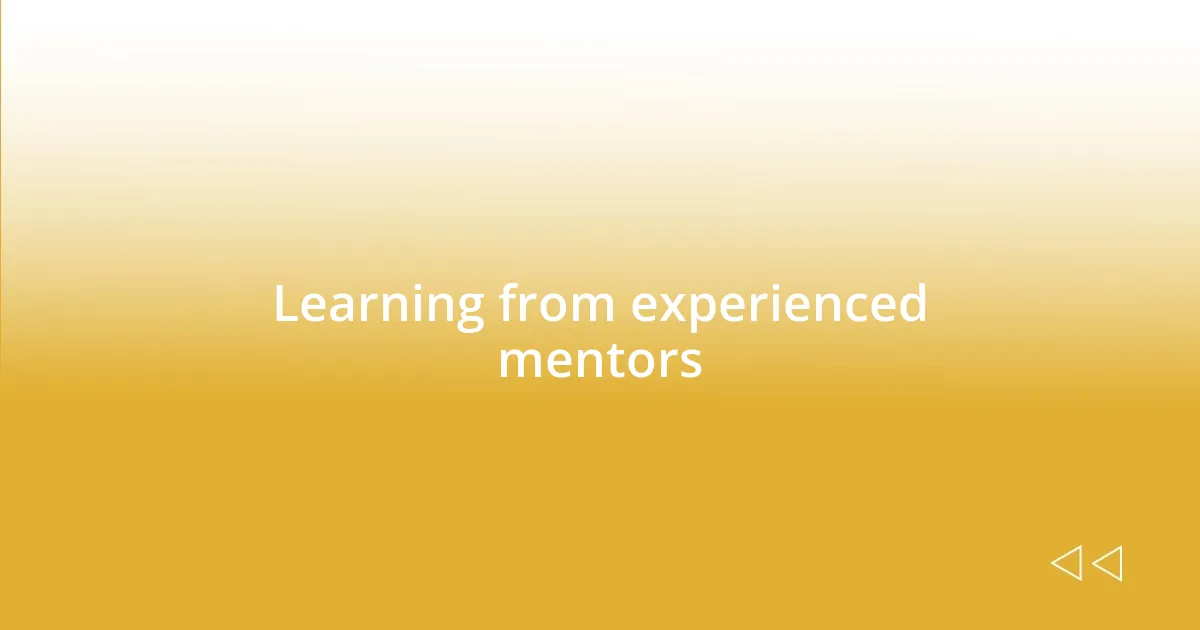
Learning from experienced mentors
Learning from experienced mentors has been a game-changer for me. I remember a time when I struggled with a particular project at work. My mentor patiently walked me through my challenges, sharing not just his knowledge, but also his belief in my potential. Didn’t I realize then how powerful guidance can be? It transformed not just my skills but my confidence as well.
What struck me most about mentorship is the value of vulnerability. One afternoon, I sat in a coffee shop with my mentor, and he confessed the mistakes he made early in his career. Listening to his story made me realize that everyone, no matter how experienced, faces hurdles. It’s this openness that makes mentorship feel relatable and human. Have you ever learned more from someone’s missteps than from their successes?
I’ve also found that mentors provide a clearer perspective on the industry landscape. When I was at a crossroads about my career direction, my mentor helped me map out potential paths. He didn’t just offer advice; he encouraged me to reflect on my passions and aspirations. That blend of insight and encouragement really made me rethink my approach. How often do we get caught up in our own thoughts, missing the broader picture? With a mentor’s insight, I learned to navigate my options more effectively.
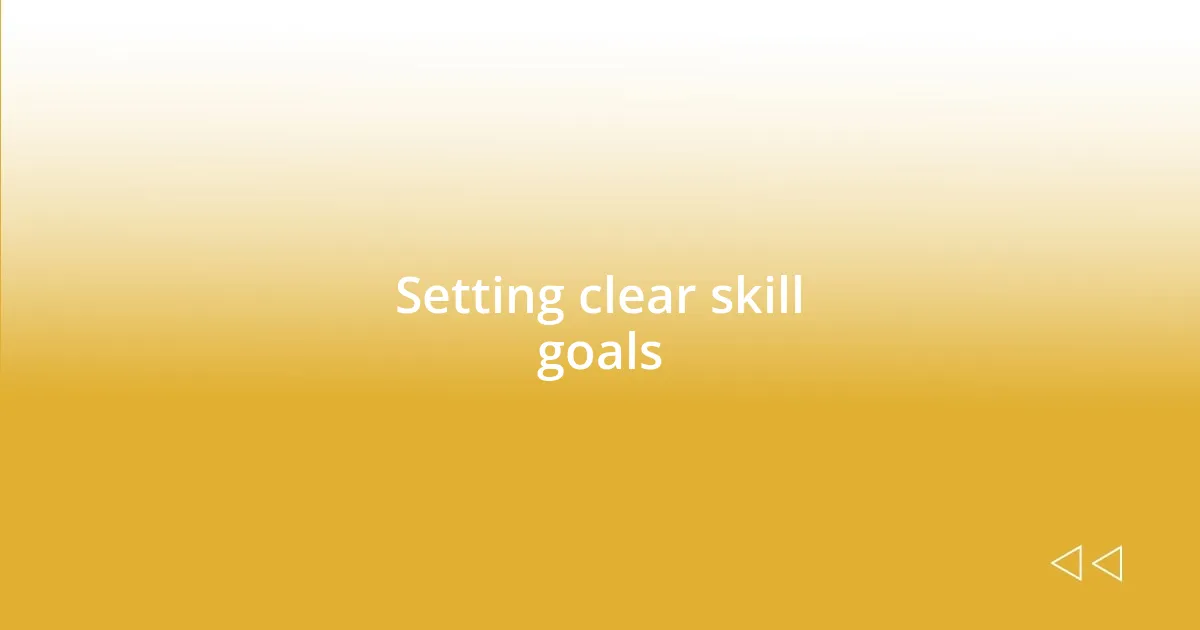
Setting clear skill goals
Setting clear skill goals has been pivotal in my growth journey. I remember distinctly when I decided to learn graphic design. At first, I was overwhelmed by the endless resources available. It wasn’t until I set specific goals—like completing an online course and creating five portfolio pieces within three months—that I felt real progress. The clarity of those targets transformed my vague ambition into focused action.
What I’ve found is that having clear goals helps to track progress. For instance, I used to think simply practicing my skills was enough. But when I began documenting my progress against specific milestones, such as mastering certain software features or techniques, it became easier to see my improvement. It’s like having a map for a journey; without that map, you might just be wandering aimlessly.
Additionally, revisiting and adjusting my goals regularly has contributed immensely to my skill enhancement. After a few months, I realized that my initial goals didn’t quite align with what I truly wanted to achieve. So, I took the time to redefine them, making sure they related more closely to my passion for photography rather than just generic design skills. This shift in focus reignited my motivation and allowed me to design with my heart, resulting in work that felt authentic and fulfilling.
| Goal Setting Aspect | Personal Experience |
|---|---|
| Specificity | Setting precise goals helped me convert a broad interest in graphic design into actionable steps. |
| Progress Tracking | Documenting my achievements against milestones provided clarity on my growth. |
| Reevaluation | Adjusting my goals ensured they remained aligned with my evolving passions, leading to more meaningful work. |
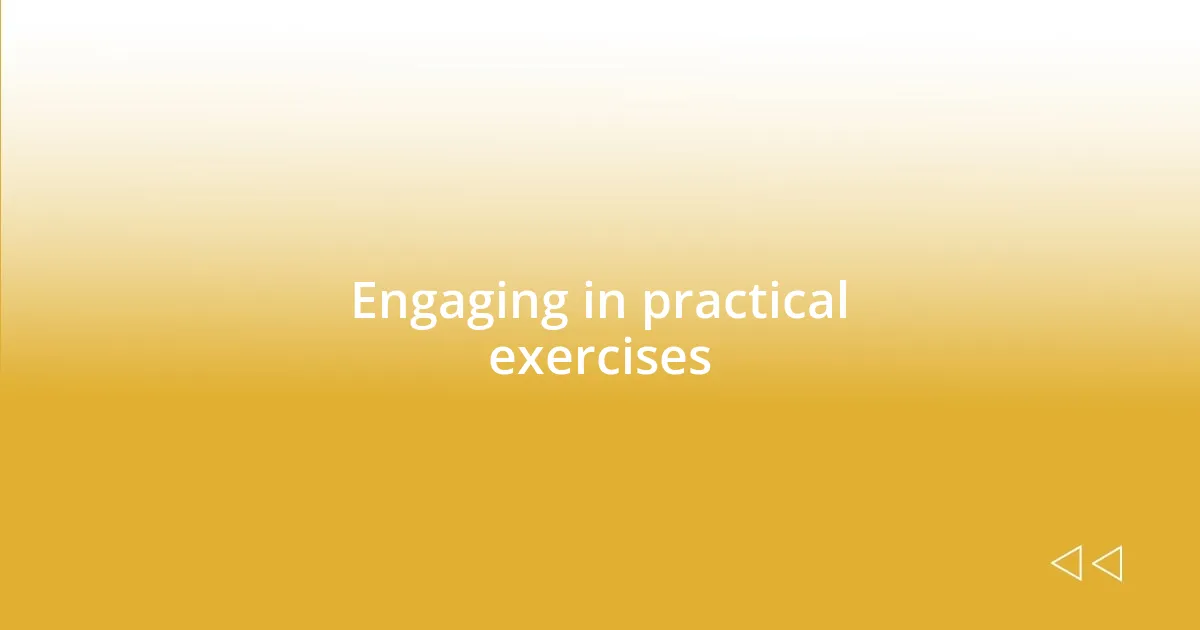
Engaging in practical exercises
Engaging in practical exercises has been an eye-opening experience for me and has played a critical role in enhancing my skills. I vividly recall the first time I joined a local pottery class. Initially intimidated by the wheel, I ended up drenched in clay but found joy in the process. From that messy first attempt, I learned that the act of creating—no matter how imperfect—brought me closer to my goal. It’s fascinating how hands-on practice can help you grasp concepts that theory alone simply can’t convey.
Here’s what I discovered during my journey with practical activities:
- Immediate Feedback: When I shaped my first bowl, the instructor’s gentle corrections helped me adjust in real-time, an experience that theory couldn’t match.
- Building Confidence: Each pot I crafted, even the most lopsided ones, boosted my self-esteem. Success became a series of small wins, steadily encouraging me to try more complex pieces.
- Community Interaction: Engaging with others in the class provided motivation and inspiration. We shared stories, techniques, and often laughed at our blunders together, creating an enriching environment.
Incorporating practical exercises into my routine has truly transformed my approach to skill development. Each experience reinforced the lesson that growth isn’t just measured in outcomes, but in shared moments and the joy of learning.
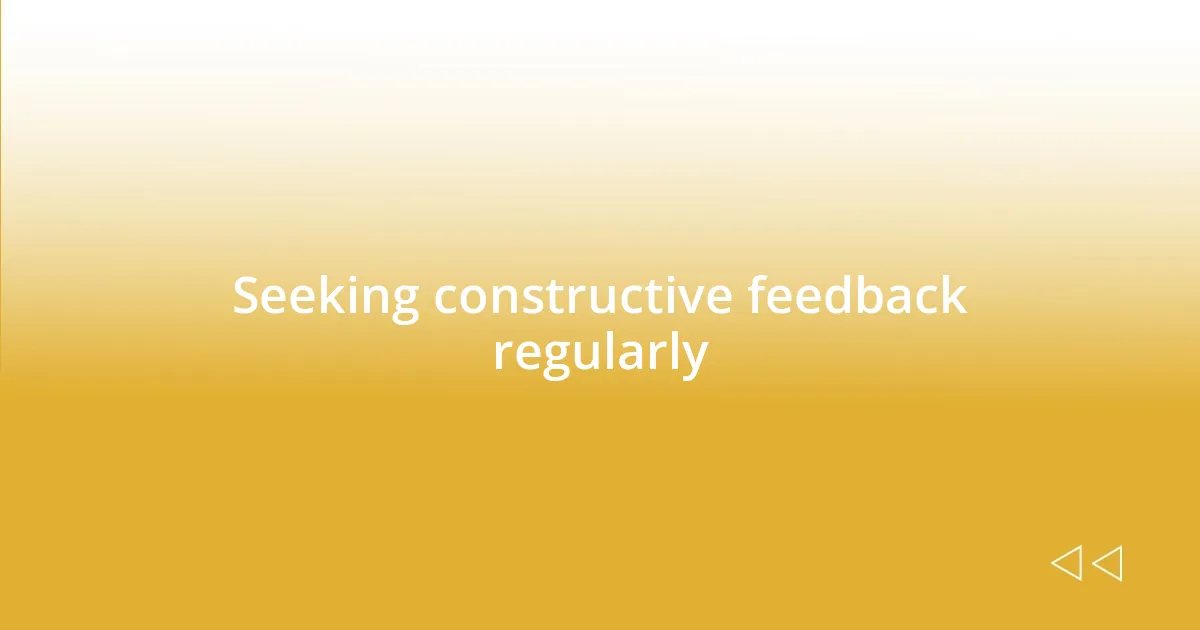
Seeking constructive feedback regularly
Seeking constructive feedback regularly has been a game changer in my skill development journey. I remember the first time I shared my design work with a mentor. I felt vulnerable, but the feedback I received opened my eyes to aspects of my work I hadn’t considered. It was a bit painful at first—after all, who likes to hear what they can improve? But as I embraced this input, I started to see it as a crucial stepping stone. Isn’t it interesting how those uncomfortable moments can lead to significant growth?
I make it a point to ask for feedback often. Recently, after completing a project, I reached out to a trusted peer for their thoughts. Their perspective highlighted not just technical areas to improve, but also ways to better communicate my ideas. This dual feedback loop—technical and communicative—has made me a more versatile creator. I genuinely believe that constructive criticism is like a mirror, reflecting both flaws and potentials. Doesn’t it feel empowering to know that each piece of feedback can push you a little closer to your goals?
Regularly seeking feedback has also built my confidence in a unique way. The more receptive I became to others’ observations, the more I started to trust my instincts during the creation process. Each positive remark not only validated my efforts but also encouraged me to experiment boldly with my style. I’ve truly come to realize that feedback isn’t just about what can be improved; it’s also about recognizing what’s working well. So, how do you feel when you hear suggestions on your work? I can honestly say that for me, embracing constructive feedback has turned a once intimidating experience into a vital part of my creative evolution.
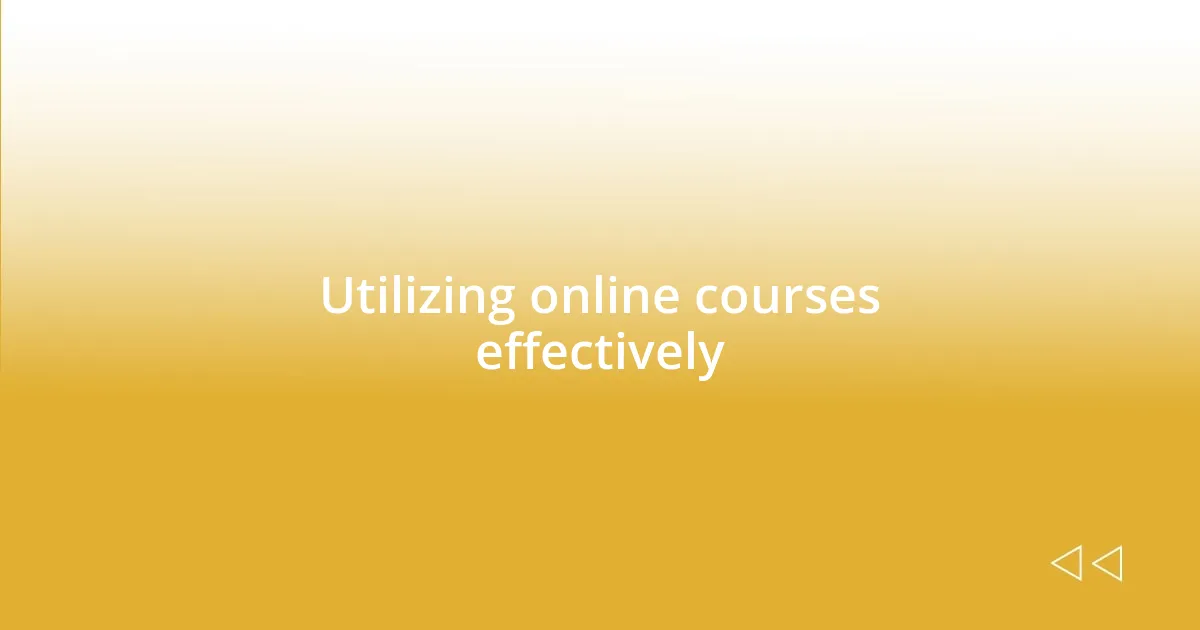
Utilizing online courses effectively
Utilizing online courses effectively has been pivotal in my quest for skill enhancement. I still remember signing up for a graphic design course, excited yet a bit overwhelmed by the sheer volume of content I had to digest. To make the most of it, I created a dedicated study schedule, breaking the course into manageable chunks. Does it surprise you how a little planning can transform an intimidating task into something much more approachable? By setting aside specific times for lessons, I found that consistency fostered not just retention but genuine understanding.
Another aspect that dramatically improved my learning experience was engaging with fellow participants in discussion forums. As I shared my thoughts and questions, I stumbled upon other learners who were equally passionate about the subject. I vividly recall one lively debate about color theory where I pushed myself to articulate my understanding, and in turn, absorbed insights from others. It felt like an enriching dialogue, which further solidified my grasp of the material. Have you ever participated in such conversations? I find they can take learning from a passive exercise to an interactive journey, making the entire experience much more enjoyable.
Finally, I learned the value of applying what I learned as soon as possible. After finishing a module on logo design, I challenged myself to create a logo for a hypothetical brand. The thrill of putting theory into practice was exhilarating! It was through this hands-on approach that concepts clicked into place, transforming knowledge into tangible skills. When was the last time you applied your learning in a real-world scenario? For me, that bridge between knowledge and practice has been essential, proving that online courses are not just about watching videos but about living the learning experience.
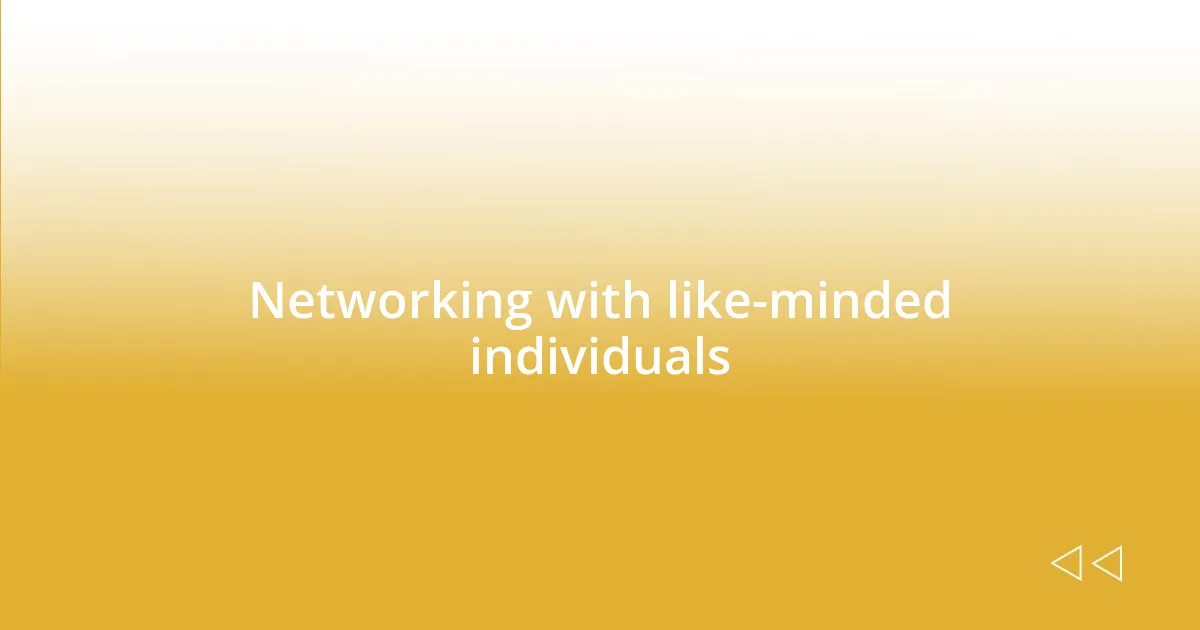
Networking with like-minded individuals
Engaging with like-minded individuals has been one of the most rewarding aspects of my personal and professional growth. I remember attending a local networking event where I met several passionate individuals who shared my interests. The excitement was palpable as we exchanged ideas, and I left feeling invigorated. Have you ever experienced that buzz from connecting with others on a similar wavelength? It’s amazing how collaboration can spark creativity and provide fresh perspectives, pushing you beyond your own limits.
I also recall a time when a fellow creative invited me to join a community project. It was daunting at first, but collaborating with others motivated me to step out of my comfort zone. As we brainstormed and ideated together, I witnessed an incredible synergy; our diverse strengths blended into something neither of us could have achieved alone. Engaging in these types of collaborations not only honed my skills but fostered a sense of belonging. Isn’t it fascinating how being part of a supportive group can encourage us to take risks we might shy away from individually?
There’s something powerful about sharing challenges and triumphs with others. I distinctly remember leading a workshop for creatives who were all navigating similar hurdles in their projects. The shared laughter over our missteps and the joy in celebrating successes built a collective resilience. It reinforced my belief that networking isn’t just about exchanging business cards; it’s about cultivating genuine relationships. How often do we overlook the strength found in our communities? For me, connecting with like-minded individuals has not just enhanced my skills but has enriched my entire journey, making every step feel a little less daunting.
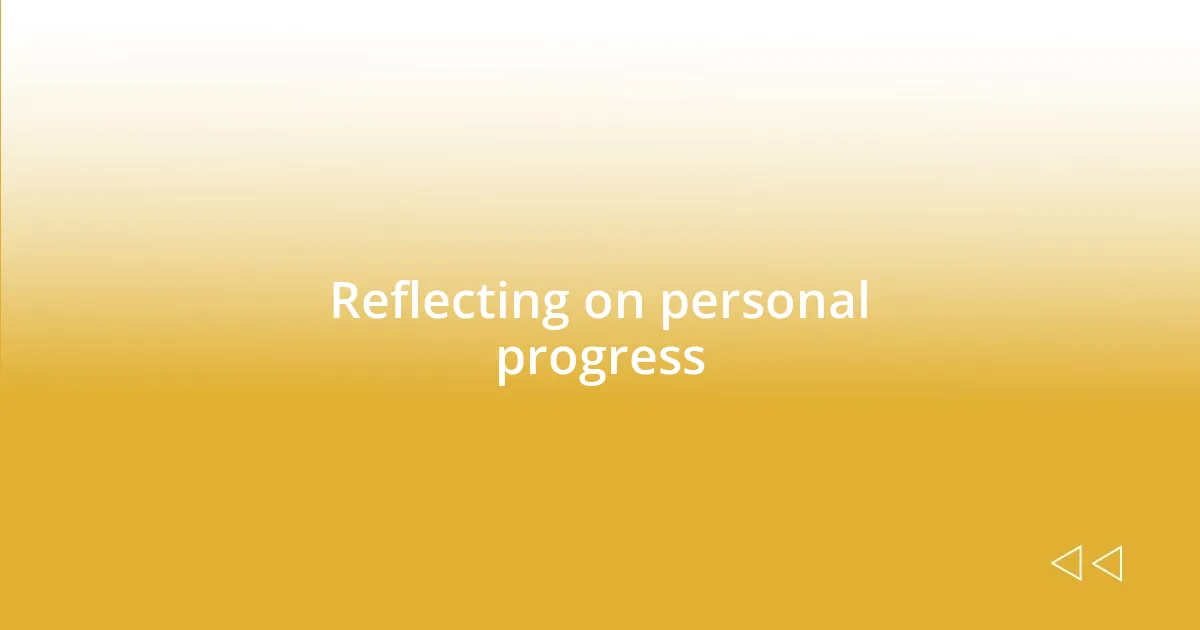
Reflecting on personal progress
Reflecting on personal progress often brings to light the small yet significant changes that contribute to our growth. I recall a moment when I looked back over the past year and realized how much I had evolved – not just in skills, but in my mindset. Have you ever taken a moment to appreciate how far you’ve come? That recognition is often the catalyst for even greater motivation, inspiring me to set even higher goals.
One time, while reviewing my completed projects, I noticed how the grainy designs from a year ago failed to match my current standards. It was both humbling and encouraging. How could something I once considered “finished” now seem so basic? This contrast fueled my desire to continuously improve and reminded me that growth is a journey, not a destination. Each project, no matter how flawed, laid the groundwork for the next step forward.
I’ve learned to embrace mistakes as teachers along my path. Recently, I struggled with a creative block while working on a complex illustration. Instead of feeling defeated, I chose to dissect the failures and understand what went wrong. I found that each misstep provided valuable insights. Isn’t it interesting how our struggles can become the most enlightening parts of our experience? Recognizing this helps me appreciate the journey and the lessons learned, reinforcing that every effort contributes to my overall progression.


